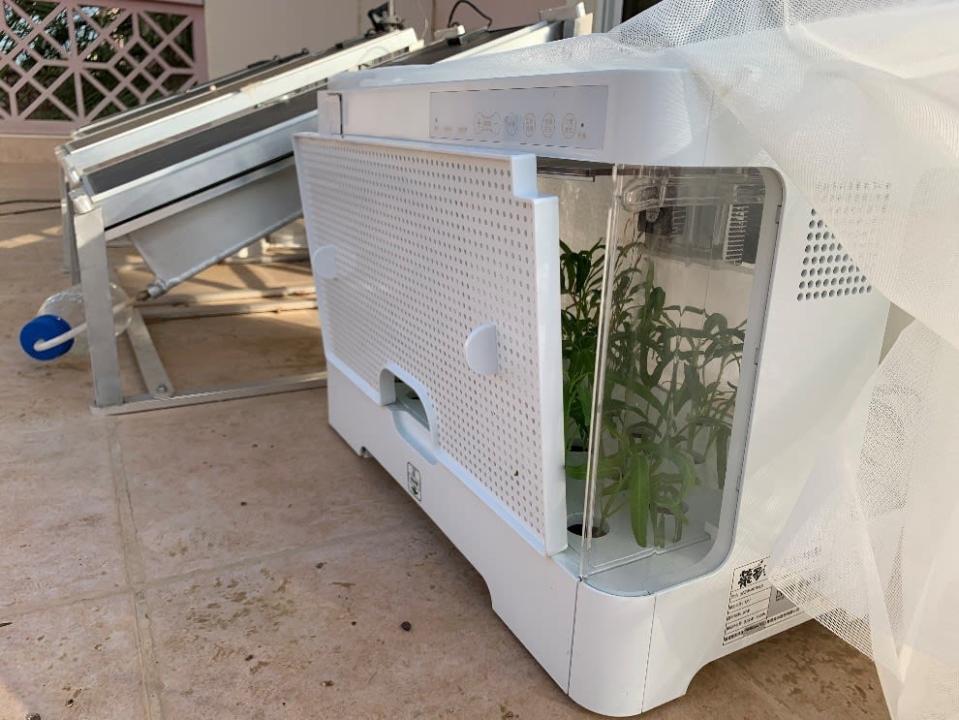This Solar Panel Sucks Water From the Air to Grow Veggies

Solar panels are pretty simple: photovoltaic cells, or PV cells, absorb sunlight, convert it into electricity, and route it into an energy grid or batteries for people to use.
This single-purpose design is now getting an upgrade. A team of scientists in Saudi Arabia have devised a solar panel with a few extra features, providing not only electricity but clean water and food as well.
This new prototype is described in a new study published on Tuesday in the journal Cell Reports Physical Science. It incorporates an innovative hydrogel into the underside of a PV cell, capable of sucking up water vapor from the surrounding atmosphere. Just add heat, and the solar panel turns that vapor into running water that can be used for a host of different applications—including the production of spinach.
“The essence of our system’s design is that we use a special material that can harvest or absorb individual water vapor from air, typically in the evening or at night, when the temperature is lower and the humidity is higher,” Peng Wang, an environmental engineer at King Abdullah University of Science and Technology and the study’s lead author, told The Daily Beast.

The new solar photovoltaic panels, which use a water-absorbing hydrogel underneath to help stay cool and increase their efficiency.
To build their new device, Wang and his team have exploited a peculiar flaw found in most solar panel designs: the production of excess heat (or “heat waste”) that results from the solar panel’s inability to fully convert all of its captured sunlight into electricity. For a typical commercial solar panel with an energy efficiency of 10 to 20 percent, said Wang, this heat waste is a whopping 80 to 90 percent of the solar energy harvested.
In the new solar panel, peak heat waste created during the daytime drives the evaporation of the stored water vapor out of the hydrogel. This evaporated water condenses and collects into a chamber that’s directly below the solar panel.
Across multiple 90-day experiments conducted in Saudi Arabia’s notoriously hot and humid summers, Wang and his team observed that this hydrogel helped to reduce the internal temperature of the solar panels by as much as 70 degrees Celsius, while also increasing electrical output by 10 percent and generating over 1,500 watt-hours of electricity.
Not only that, the two liters of water collected during a two-week period were used to grow nearly 60 specimens of water spinach—more commonly known as kangkong and found throughout Southeast Asia.

The Saudi team's solar panels connected to a plant-growing box that contains 60 water spinach seeds.
Wang said there are certain factors, like amount of sunlight, ambient humidity and temperature, that may affect how much electricity, water, or crops the device produces. But overall, he’s hopeful his team’s system will provide off-grid communities worldwide a readily available and decentralized energy and food resource.
“We have a very ambitious goal of achieving the UN’s Sustainable Development Goals by 2030,” said Wang. “We are asking for equitable water, equitable clean energy for everyone. The problem is how do we lift the most impoverished communities up to the standard? They need a decentralized approach to improve their lives.”
The next step for Wang and his team is to improve the longevity of the hydrogel—which may need to be replaced around every two years—and to automate the device’s switching from cooling the solar panels during the day to water collection at night, currently a manual process.
And while Wang and his team’s improved solar panel is unlikely to rival other water scarcity technologies like desalination systems, he sees the scale of his device more attuned to the needs of smaller communities and more economically friendly.
As the popularity and sale of solar panels is expected to soar in the coming years, you might want to keep an eye out for solar devices that will let you replace your trusty Britta filter, and grow your vegetable garden.
Got a tip? Send it to The Daily Beast here
Get the Daily Beast's biggest scoops and scandals delivered right to your inbox. Sign up now.
Stay informed and gain unlimited access to the Daily Beast's unmatched reporting. Subscribe now.

 Yahoo News
Yahoo News 
